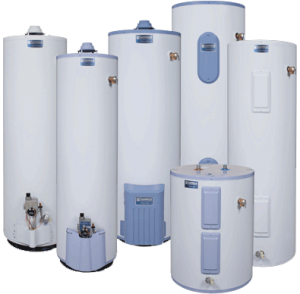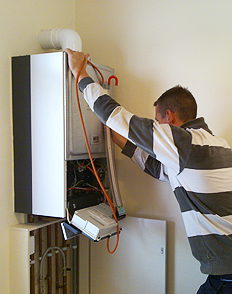Stockton Water Heater Repairs and Installations
There are five major types of water heater; conventional storage heaters, demand (tankless or instantaneous) heaters, heat pump heaters, solar water heaters, and indirect (tankless coil) heaters. The climate in Stockton allows the use of any of these types, although indirect and heat pump heaters are far less common than the others.
conventional storage heaters, demand (tankless or instantaneous) heaters, heat pump heaters, solar water heaters, and indirect (tankless coil) heaters. The climate in Stockton allows the use of any of these types, although indirect and heat pump heaters are far less common than the others.
If you are looking to replace your existing water heater with a new one, energy efficiency should be one of your top priorities. Tankless and solar heating systems are the most efficient, saving up to 50% on energy usage compared to comparable conventional storage heaters. Tankless heaters are also much cheaper to maintain and if they do need service, most of the parts can be replaced for a minimal cost.
Water & Money Saving Tips For Your Water Heater
Solar heating systems are usually used in conjunction with another type of heater. The solar heat then works as a preheating source, allowing the primary water heater to use less energy to maintain or deliver hot water with less work. If you are looking to improve the efficiency of your current conventional water heater there are several things that you can do:
Purchase an insulated jacket for your model of water heater. This will prevent it from losing radiant heat and lower the amount of time it takes to bring cool water up to deliverable temperature.
Insulate the hot water pipes running from the hot water heater to your faucets. This helps prevent heat loss in the trip from the water heater to the delivery area. Doing this can allow you to turn down your water temperature up to 4 degrees.
to your faucets. This helps prevent heat loss in the trip from the water heater to the delivery area. Doing this can allow you to turn down your water temperature up to 4 degrees.
Replace leaky valves. This should be done by a licensed plumber. Leaky valves not only cost money in lost water, but they are also a major source of radiant heat transfer.
Place a magnet on the intake pipe of the water heater. The magnet will attract metallic calcium particles and keeps them from entering the tank. The closer you put the magnet to the body of the water heater, the more calcium it will catch.
Change out the anode rod every seven years. This rod is placed in the tank specifically to prevent the steel body of the water heater from rusting. It attracts the free radicals in the heated water and they corrode the anode instead of the tank.